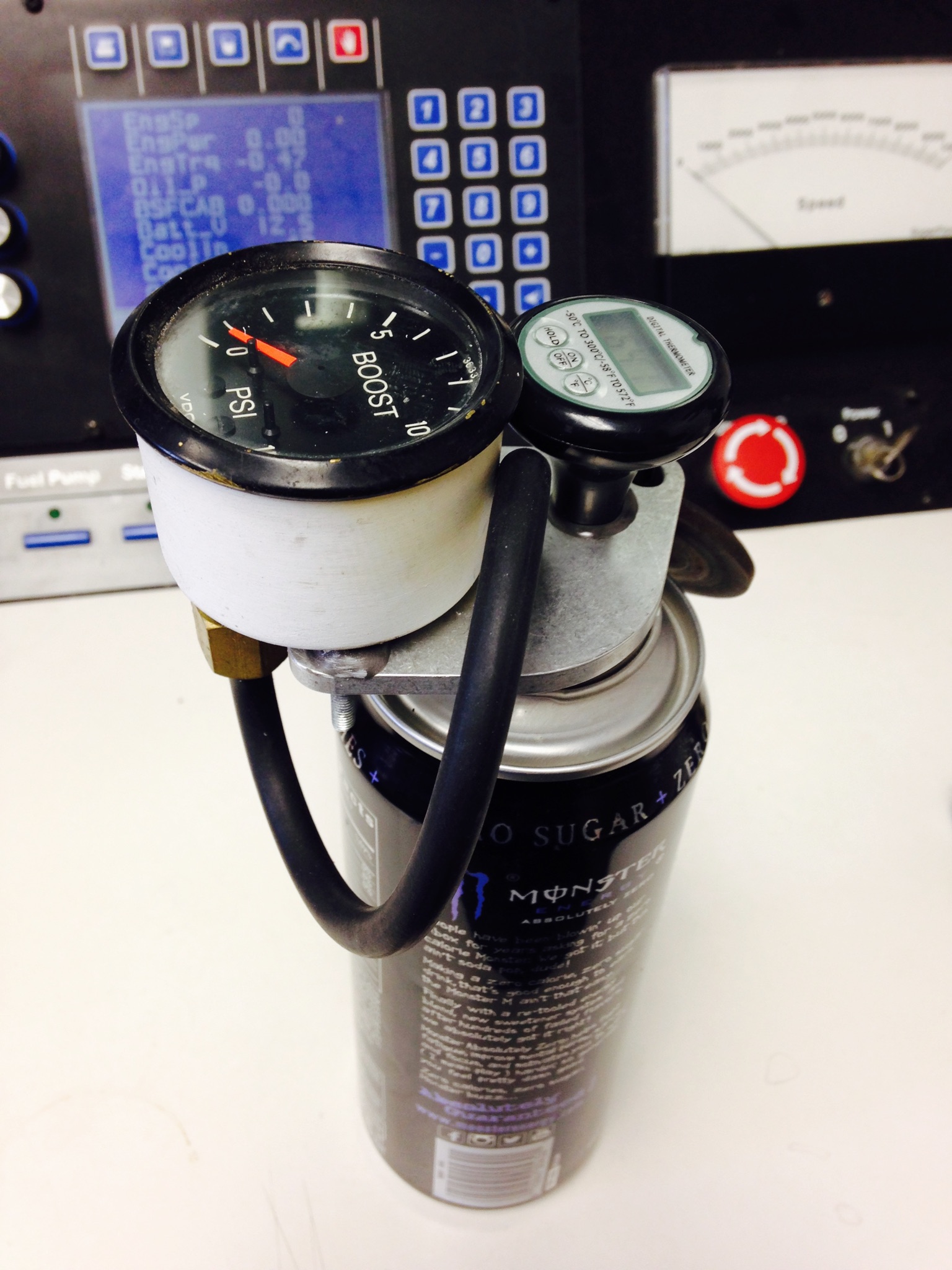January 2015
Saturday, January 03, 2015
DynoTech : Home RVP tester (HVP) for $30

Here's a prototype home RVP test "bomb" (that's what RVP test vessels are referred to!) that I created. It's a 24 oz resealable Monster Energy Drink aluminum can with a small aluminum plate JB Welded to the cap. Two holes are drilled in the plate into the cap--one for a 1/8" hose barb and the onther for a long probe Amazon.com $15 digital food thermometer [that is as accurate as the digital temp gauge on our $6000 Koehler RVP test bath/ bomb system]. Both are epoxied into place (you can see the nice bead of JB Weld around the base of the thermometer).
To test the portable Home Vapor Test bomb, I chilled the whole unit to close to 32F and poured in 1/5th the volume of my C16/ isopentane test mixture that had tested at 8.75psi (HVP) in our Kohler test unit. I put the HVP bomb in the sink, and with hot water/ hot air brought the fuel temp up to 100.0F, agitated it, and got 9.75psi on the 0-15psi boost gauge! The insignificant difference is likely the result in cheap gauge calibration vs. $300 lab certified pressure gauge. I plan to compare the two. But this is totally acceptable for HVP testing.
With a unit like this everyone should test their expensive race gas to see how fresh or stale it is. Last Sunday I had a hilldrag racer come to tune a 180hp Speedwerx 800 Cat ex-SnowCross race engine. His sealed pail of C16 (a poor choice for winter dragracing since as-refined RVP is 1.5psi--VP has a new high RVP 116 octane fuel which is a much better choice) turened out to be devoid of what few front ends it was created with--0psi as tested on our Kohler RVP test unit. D.O.A.. We dyno tuned it cautiously, and as we approached 12.5/1 A/F (max HP is typically obtained at 13/1 with truly fresh fuel) it becan to detonate, implying that the 12.5/1 A/F was probably more like 13.5/1 net vaporizing in the combustion chambers, due to the lack of front end fuel molecules. So we were unable to achieve max HP because of the stale fuel--remember, those unburned globules of unvaporized fuel take up space in the combustion chamber, displacing O2! But I was pleased that the owner of the sled could hear the clicks of deto on our copper tube, which at 12.5/1 tied in with the absence of front ends in the high buck sealed pail of fuel. And we need to remember that each of those loud snaps we hear on the copper tube is = to Mighty Mouse whacking the piston with a sledge hammer, scouring away the boundary layer of air that insulates aluminum parts (that melt at 1200f) from 5000f fire!
What every racer should do is build their own HVP tester out of some aluminum or stainless steel container that's more substantial than a soft drink can. Then ask the fuel reseller to gaurantee some % of listed RVP. I'm personally good with, say, 75%, especially in summertime when refineries often scrimp on front end additives (ie winter pump gas is typically 10-12psi, summer 5-6psi). Show them a link to the DTR blog.
Before sweet corn was genetically reengineered to have enough sugar in it to last a month before consumption, I used to go to the farm corn stand and buy one ear for 50 cents. I'd take a bite out of it and if tasted like "cow corn" I'd pitch the ear out into the field and go somewhere else. If it was truly fresh and sweet, I'd buy the other 11 ears, confident that the family would be pleased with my purchase!
When you go to buy race gas from a bulk reseller, bring your HVP tester in a cooler of ice. Buy 5 oz of what you need, pour into your HVP bomb and warm it up in the warm air blowing from your vehicle's heater watching carefully until you get to 100.0f which will indicate with reasonably accuracy the true RVP by doing the math as shown in a previous blog. Then you can make an educated decision on wether to buy, or not to buy the fuel. If the RVP is low, maybe the reseller can go back to the wholesaler and try to figure out where the fuel's front ends have gone.
.
Archives
May 2015
March 2015
January 2015
December 2014
November 2014
November 2013
October 2013
September 2013
April 2013
March 2013
February 2013
January 2013
October 2012
September 2012
July 2012
May 2012
February 2012
December 2011
November 2011
September 2011
August 2011
June 2011
February 2011
January 2011
December 2010
November 2010
October 2010
September 2010
July 2010
June 2010
May 2010
April 2010
March 2010
January 2010
November 2009
October 2009
August 2009
June 2009
May 2009
April 2009
March 2009
February 2009
December 2008
November 2008
October 2008
September 2008
August 2008
July 2008
June 2008
May 2008
April 2008
March 2008
February 2008
January 2008
December 2007
November 2007
October 2007
September 2007
August 2007
July 2007
June 2007
May 2007
April 2007
March 2007
February 2007
January 2007
December 2006
October 2006
September 2006
August 2006
July 2006
June 2006
May 2006
April 2006
March 2006
February 2006
January 2006
December 2005
November 2005
October 2005
September 2005
August 2005
July 2005
June 2005
May 2005
April 2005
February 2005
January 2005
December 2004
November 2004
October 2004
September 2002
Misc.
Search
Admin Login
